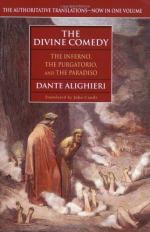Such harvest reap I of the seed I sow’d.
O man, why place thy heart where there doth need
Exclusion of participants in good?
This is Rinieri’s spirit, this the boast
And honour of the house of Calboli,
Where of his worth no heritage remains.
Nor his the only blood, that hath been stript
(’twixt Po, the mount, the Reno, and the shore,)
Of all that truth or fancy asks for bliss;
But in those limits such a growth has sprung
Of rank and venom’d roots, as long would mock
Slow culture’s toil. Where is good Liziohere
Manardi, Traversalo, and Carpigna?
O bastard slips of old Romagna’s line!
When in Bologna the low artisan,
And in Faenza yon Bernardin sprouts,
A gentle cyon from ignoble stem.
Wonder not, Tuscan, if thou see me weep,
When I recall to mind those once lov’d names,
Guido of Prata, and of Azzo him
That dwelt with you; Tignoso and his troop,
With Traversaro’s house and Anastagio’s,
(Each race disherited) and beside these,
The ladies and the knights, the toils and ease,
That witch’d us into love and courtesy;
Where now such malice reigns in recreant hearts.
O Brettinoro! wherefore tarriest still,
Since forth of thee thy family hath gone,
And many, hating evil, join’d their steps?
Well doeth he, that bids his lineage cease,
Bagnacavallo; Castracaro ill,
And Conio worse, who care to propagate
A race of Counties from such blood as theirs.
Well shall ye also do, Pagani, then
When from amongst you tries your demon child.
Not so, howe’er, that henceforth there remain
True proof of what ye were. O Hugolin!
Thou sprung of Fantolini’s line! thy name
Is safe, since none is look’d for after thee
To cloud its lustre, warping from thy stock.
But, Tuscan, go thy ways; for now I take
Far more delight in weeping than in words.
Such pity for your sakes hath wrung my heart.”
We knew those gentle spirits at parting heard
Our steps. Their silence therefore of our way
Assur’d us. Soon as we had quitted them,
Advancing onward, lo! a voice that seem’d
Like vollied light’ning, when it rives the air,
Met us, and shouted, “Whosoever finds
Will slay me,” then fled from us, as the bolt
Lanc’d sudden from a downward-rushing cloud.
When it had giv’n short truce unto our hearing,
Behold the other with a crash as loud
As the quick-following thunder: “Mark in
me
Aglauros turn’d to rock.” I at the
sound
Retreating drew more closely to my guide.
Now in mute stillness rested all the air:
And thus he spake: “There was the galling
bit.
But your old enemy so baits his hook,
He drags you eager to him. Hence nor curb
Avails you, nor reclaiming call. Heav’n
calls
And round about you wheeling courts your gaze
With everlasting beauties. Yet your eye
Turns with fond doting still upon the earth.
Therefore He smites you who discerneth all.”




